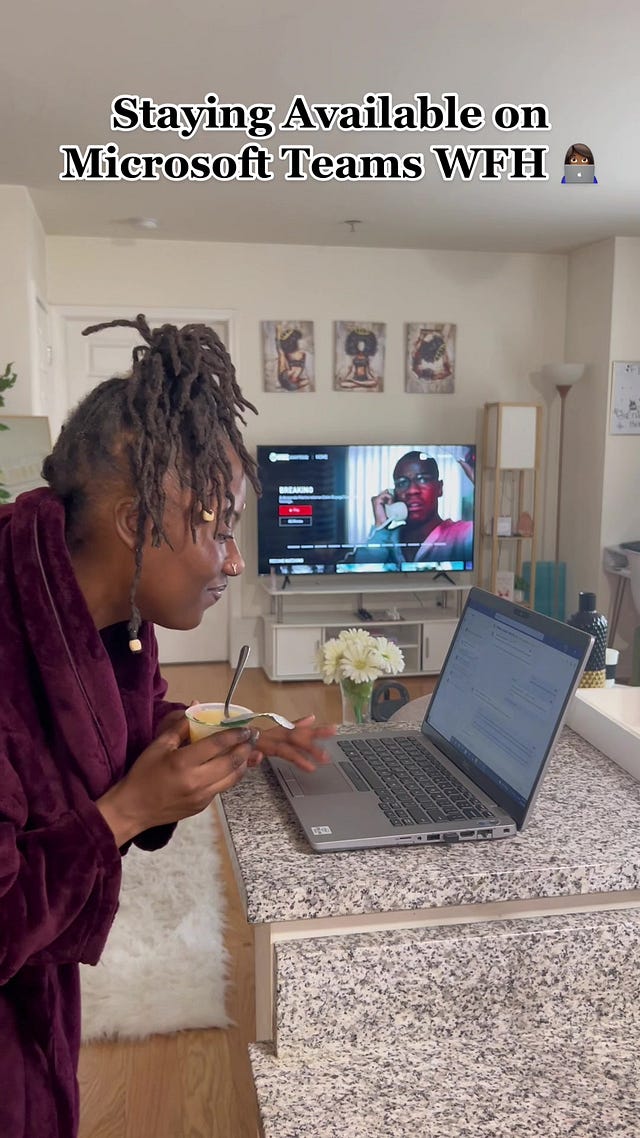The “green dot monitors” plaguing remote work
And other digital corporate power moves.
Embedded is your essential guide to what’s good on the internet, written by Kate Lindsay and edited by Nick Catucci.
I am my own boss (and she’s a piece of work). —Kate
My first job after college was as an intern for a literary agent, and I worked with her and the family’s yellow lab on the top floor of her house in Boston. My next job was in a small WeWork room, shared with the four other New York employees of a women’s media website that was based in California. There was no pretense at these roles, no corporate jargon being tossed around, because it’s hard to seriously ask someone if they “could circle back on the deliverables” when a lab just farted.
Much of my media career has been a mix of these less formal workspaces and freelancing, and because of this, I’m not that familiar with what a “normal” “professional” “workplace” is like. I’m often shocked when I hear from friends in more traditional industries about certain expectations. But there’s one practice I’ve come across that I’m confident isn’t just weird to me, because it should be weird to everyone: “green dot monitoring.”
On whatever system your company uses to communicate, there’s probably some kind of symbol that shows that you’re online. On Slack, it’s a little green dot. You can accompany it with a food emoji when you’re at lunch, or maybe even a big “X” when you’re focusing, but if you’re unlucky enough to be the employee of a green dot monitor—a manager who requires you to be visibly online for the entire workday—you can never, ever let that icon go dark.
Jokey methods of “keeping the green dot active” became a genre of video on TikTok, especially in the beginning of the pandemic. In March 2020, a green dot was our socially-distant replacement for a butt in a seat, back when that was assumed to be the only way an employee could effectively work. But as years of remote work passed, it became clear that employees working from home were just as productive despite not being in an office, despite not sitting straight up at their desks, despite maybe not even being at their work computers for eight hours every day.
No one in power seems quite sure how to handle the reality that most workers prefer, and in many cases thrive, in a remote or hybrid situation (and I say this as someone who actually prefers going into an office). But some are definitely weaponizing technology to try and regain what they see as their upper hand.
These subtle digital power moves are being enforced in a variety of ways. In 2021, my friend was at a Zoom seminar orchestrated by her company’s HR along with 100 other employees. She was one of many who had their camera off, prompting the host of the seminar to begin with a little lecture: “In this modern age, not having your Zoom camera on is rude, disrespectful, and shows that you’re not engaged,” my friend remembers the host saying. “It’s like being in an in-person meeting and turning your chair the other way.” He went on to call out the people with their cameras off by name.
Others I’ve spoken to have been asked to explain themselves whenever their green dot has gone idle for a period of time, and so they feel a pressure to keep it active throughout the day. The expectation that anyone should work an entire eight-hour stretch with their eyes glued to their laptop, their fingers furiously typing, is not one we ever had in offices, so I’m not sure why it’s become something that’s demanded of workers when they’re home. Sometimes people need to go offline—not because they got a call from their family, or need to run an urgent errand, or are rescuing puppies by the side of the highway, or whatever reason sounds most morally defensible, but because they simply need a break.
What bothers me most about both these anecdotes isn’t just the level of digital surveillance companies feel entitled to, but the sheer hypocrisy of it all. They’re perfectly happy to equate remote work to office work when it comes to getting what they want (a green dot equates to sitting in your desk, camera off equates to turning your chair away in a meeting) but when it comes to the actual work produced, suddenly it’s not the same. The work you do at home is somehow not equivalent to you doing the same work in the office.
And the idea that the status of someone’s dot is a more important indicator of their work ethic than the actual work they turn in makes no sense. If assignments are handed in on time, if the quality of work isn’t lagging, then I’m not sure why it matters if they spent six uninterrupted hours on the computer doing it, or many 20-minute bursts. Unless their job is to refine macrodata a la Severance, they’re not being paid to Be On Laptop, they’re being paid for the work they’ve proved they can produce.





YES.